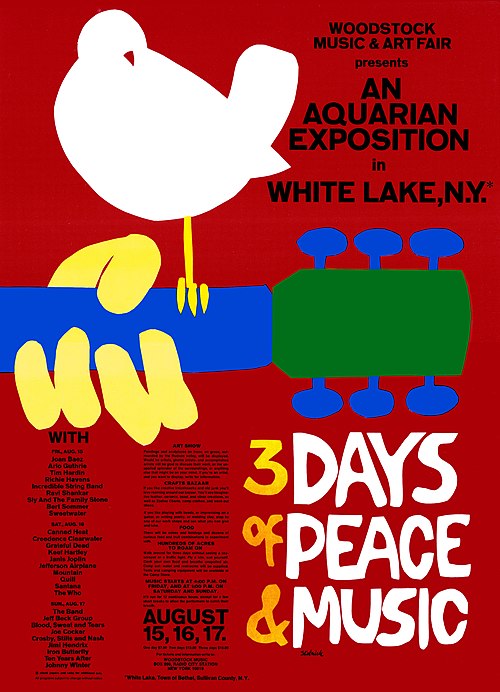Woodstock

Three days of peace, love and music. |
In the Summer of '69, a couple of capitalists decided to hold a festival in a field, with a few big name acts. After a long fight to get it done, they got a deal with farmer Max Yasgur. The festival was called Woodstock.
Originally tickets were sold by mail and through magazine ads, with plans to sell more at the door. Over 100,000 tickets were sold, but people started arriving several days early, before the fence and ticket gates were completed; faced with the choice between completing the stage and completing the fence, the promoters decided to get the stage in order and call it a free concert. With such an open invitation in place, over 500,000 people are believed to have shown up. Then It Got Worse. Woodstock was a giant catastrophe: The bands couldn't get to the concert and had to be flown in. Food and other facilities were ostensibly planned for 50,000 (even though the aforementioned 100,000 tickets had been sold), but city councilmen and others noted that the provisions weren't even sufficient for that number, leading to the National Guard airlifting in food and water by helicopter. There was lots of rain and a giant storm struck, shutting it down for hours and two people accidentally died[1].
But at the same time the festival was noted for its sense of peace. Not a single fight broke out during the three days. People were getting along and showing love to each other. Not only that, but the roster of bands were great. These included The Who, The Band, Janis Joplin, Crosby, Stills & Nash, Canned Heat, Ten Years After, Santana, The Grateful Dead, Creedence Clearwater Revival, Joan Baez and Jimi Hendrix, to name a few.
The festival was filmed and turned into a documentary. It is regarded as one of the best documentaries and concert films ever. Not only because of the performances, but also as the main focus was the festival itself. It really portrays the atmosphere and the feelings there. It was also one of Martin Scorsese's first works (he was an editor for it).
Woodstock was the swan song for The Sixties. It showed the dream of peace and understanding as working, combined with great music. But not long after, an attempt at a West Coast equivalent, a free concert at the Altamont Speedway headed up by The Rolling Stones, would end in tragedy -- a man wound up getting killed by the Hells Angels, who had been hired as security. (This concert and its cruel outcome were chronicled the documentary Gimme Shelter.) The innocence that was the height of Woodstock would die and later attempts to recapture its spirit were all failures, including two Woodstock "sequels" in 1994 and 1999. The 1999 Woodstock became legendary for its audience rioting on the final night, which went completely against the spirit of the first, and showcased just how much society had moved to the other end of the Sliding Scale of Idealism Versus Cynicism since the idealistic '60s.
In media depictions of Woodstock, fictional or otherwise, the Nostalgia Filter will be operating at full power. Characters flashing back to Woodstock will have all been Bohemian hippies, despite a large number of ordinary joes and returning Vietnam vets. Traffic jams and overpriced concessions (while they lasted) will be replaced by camping out in vans and everybody sharing out of a sense of peace and love. The filthy conditions will be either ignored or romanticized as free-spirited youth playing in the mud. The music will be Nothing but Hits, despite the lineup consisting of five or six headliners and dozens of forgettable and not-yet-famous bands.
Despite all this, however, such depictions still capture the most important thing about the festival: its transformative effect on all who were there. To this day the original is regarded as a Crowning Moment of Awesome among people, showing them living happy and in peace among each other.
In 1994 there was a 25th anniversary festival commemorating the original Woodstock, and in early 2019 a 50th anniversary festival was announced.
- Berserk Button: Yes, even the original Woodstock had an incident of this: Abbie Hoffman got booted off the stage by (and received a Precision F-Strike from) Pete Townshend for walking on during The Who's set.
- Borscht Belt: Bethel, New York, the location of the festival, is right smack in the middle of the Borscht Belt, ironically enough.
- Darker and Edgier: Woodstock 1999 compared to the Original Woodstock.
- Erudite Stoner: Quite a few show up in the crew.
- Follow the Leader: The organizers billed the festival as an "Aquarian Exposition" simply to take advantage of the popularity of Hair, which was on Broadway at the time, and its hit opening number "Aquarius".
- The Movie: Made from footage captured during the three days, Woodstock was Warner Bros' biggest hit in 1970.
- New Age Retro Hippie: Yeah, there were a few who went.
- Performance Anxiety: During their set, Stephen Stills of Crosby, Stills & Nash admitted to the audience that it was only the second time that the group had ever performed in front of other people, and they were, quote, "scared shitless".
- The Sixties: Some of the most noted events and it really sums up the spirit of the decade.
- Sliding Scale of Idealism Versus Cynicism: Compare the original Woodstock to the 1999 version, and you should have a grasp of the hippie idealism of The Sixties versus the Grunge cynicism of The Nineties.
- The Stoner: Does this need explaining?
- ↑ plus one from a burst appendix, but that probably would have happened anyway